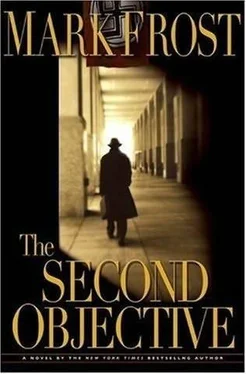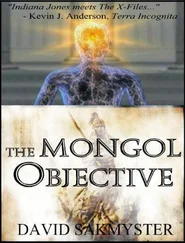“What’s the new vice president’s name?” asked Carlson.
“What?”
“The new vice president. What’s his name?”
“What do you want to know for?”
“I just want to know,” said Carlson, his hand on the butt of his pistol.
“Harry S Truman, from my home state of Missouri,” said the sergeant, spitting some tobacco. “What the hell’s wrong with you, son?”
“I think he’s okay, Earl,” said Carlson.
“Thanks, Ole.”
Grannit told the sergeant what they’d run into at Malmédy. Other men from the platoon drifted forward to listen. He skimped on detail, but it was still the most news they’d had since the attack began.
“What’s backing you up on the other side of the river?” asked Grannit.
“Backing us up? Not a damn thing. Everything’s supposed to be in front of us. We’re it, brother.”
“So what’s over there?”
“Cows, dairy farms, and a shitload of pissed-off Belgians.”
“Where’s this road lead?”
“Once you’re across, about fifteen miles west it ties into their main highway. Straight shot from there to Brussels, about forty miles, then another thirty to Antwerp.”
Grannit held the hand-drawn map out to the sergeant. “You have any idea what angle you’d have to be looking at your bridge to draw this?”
“Up on that bluff, most likely,” said the sergeant, pointing to some low hills to the east. “Where’d you get this?”
Grannit ignored the question. “Any jeeps come through here the last two days with guys saying they’re from Twelfth Army?”
The sergeant canvassed his platoon. “Don’t ring a bell, Lieutenant.”
Grannit looked up toward the hill behind them. “Your boys know the way up there?”
“Sure, we patrol it all the time.” The sergeant ordered one of his men into the jeep with Grannit and Carlson. “Duffy’ll take you up.”
It took ten minutes up a steep dirt switchback road to reach the summit. Grannit climbed out and walked along the ridge until he found an opening in the trees that offered a view down at the bridge. He compared it to the map. The angles and perspectives matched perfectly. Grannit signaled to Ole and the private.
“Spread out and search this area,” he said.
A short distance away, Carlson found some tire tracks that had pulled off the road. They followed them fifteen yards into the woods and in a small clearing found the remains of a campsite: discarded K-ration wrappers, a few soggy cigarette butts. Grannit examined them.
Lucky Strikes. The brand he’d found at the Elsenborn checkpoint, smoked down to the nub.
“They were here,” said Grannit. “Before the attack even started. That’s the reason for the American uniforms, that’s why they came over the line. They sent teams in to scout these bridges.”
“Why’s that?”
“Because this is where they’re headed. They don’t give a damn about Malmédy or Liège or Spa-”
“Earl-”
“This isn’t about taking back ground or engaging us where we stand. They’re going to cross this river and drive straight for the coast-”
“Hey, Earl,” said Carlson. “There’s a jeep coming down the river road.”
Carlson handed Grannit his field glasses. He steadied them on Carlson’s shoulder, found the road, then picked out a Willys heading south, slowing as it approached the checkpoint at the bridge.
There were four men in the jeep.
Grannit ran for their own jeep, shouting for the others to follow.
Waimes, Belgium
DECEMBER 17, 4:30 P.M.
Traffic slowed as daylight began to fail, German vehicles passing now in clusters instead of a steady stream. Bernie could see their oncoming headlights splash across the side of a barn at the corner just before they turned right and exited the village. He waited until the barn went dark, then burst out of the trees toward the road. The barn lit up again just before he reached the front of the pavement. Ten seconds to cross over and reach the shadows behind the barn.
The approaching vehicle leaned around the corner at high speed before he was halfway across. Bernie picked up his pace, cleared the far side, and sprinted for the barn. The headlights swept across him just as he flattened his back against the wall, but the German scout car shooting past him down the road never hesitated. He caught his breath, then crept along the dark side of the barn toward the edge of town.
He heard footsteps crunching in the snow, voices speaking German just around the corner, and he froze in place. Two soldiers walked around the building ahead of him, rifles on their shoulders. Bernie was about to step out and speak to them in German when he saw the double-lightning insignia of the SS on their collars. Images of the shooters who’d gone to work in the meadow flooded his mind. He leaned back into the dark and waited for them to pass out of sight.
He crept cautiously down an alley in the failing light until he found Frau Escher’s butcher shop. He tried the back door, but it was locked, and he saw no lights inside. Bernie moved around the side until he found a narrow casement window at ground level that fed down into the cellar. He leaned down, broke the pane with his elbow, brushed the splinters out, reached in to undo the lock, and lifted the frame. He lay down on his belly and shimmied backward into and through the opening, feeling for the ground inside with his feet.
When he dropped to the floor, Bernie pulled out his lighter, turned up the wick, and waited for his eyes to adjust to the faint, flickering light. He was in a storage room with a dirt floor, and a pile of firewood and a variety of cans, boxes, and tools stacked against the walls. He moved to the room’s only door, opened it quietly, and stepped into a short hallway covered with filthy, chipped linoleum.
On the left, a steep flight of open stairs without a banister led up to the first floor and ended at a door. A second door was straight ahead of him at the end of the hall he was in. In the gloom of the basement he could see at least one other door, possibly to a closet. He started up the stairs. They creaked loudly under his feet. As he was about to reach the door at the top, he heard something move in the room at the end of the hallway down below.
Bernie stopped midstep, held his breath, and listened. A few moments later he heard the sound again. A slight rustling, some substantial mass shifting in place against the floor. It sounded heavy and alive. An animal most likely. Maybe she kept livestock down here. He remembered the unidentifiable carcass he’d seen earlier hanging in the woman’s abattoir. He tried to erase that picture from his mind as he reached for the doorknob.
A low, keening moan issued from the room down below and sent chills crawling across the back of his neck. Startled, Bernie turned toward the sound; the flame wavered in the air, burning his hand, and he dropped the lighter. It clattered through the gap between the stairs; the flame went out as it fell from sight, and the basement plunged into absolute darkness.
The sound again. He realized that his first instinct had been wrong; it wasn’t an animal. A terrible sound of pain and despair-only a human voice could express such suffering.
Bernie stopped in place, trying to orient himself in the darkness. He turned carefully and reached his hands ahead of him for the door at the top of the steps, located the knob, and turned it. Locked. He leaned forward and pressed his full weight against it. The door felt substantial, unyielding. He wouldn’t be able to attack it successfully in the dark.
Another pitiable moan issued from the room below.
Despite the cold, he felt sweat break out all along his brow. He felt his hands shaking. Afraid he might lose his balance, he turned and sat down on a step below him, trying to settle his nerves.
Читать дальше












